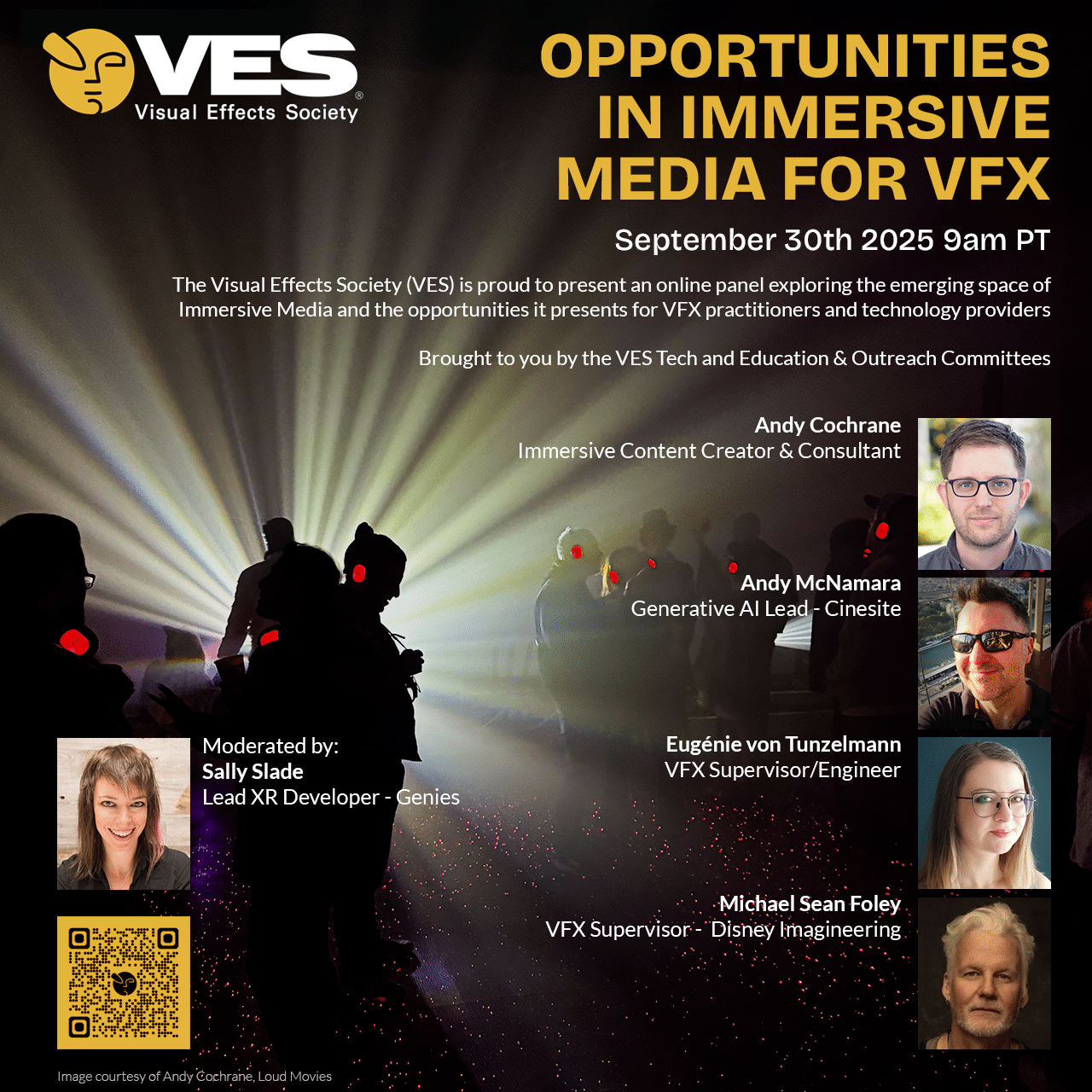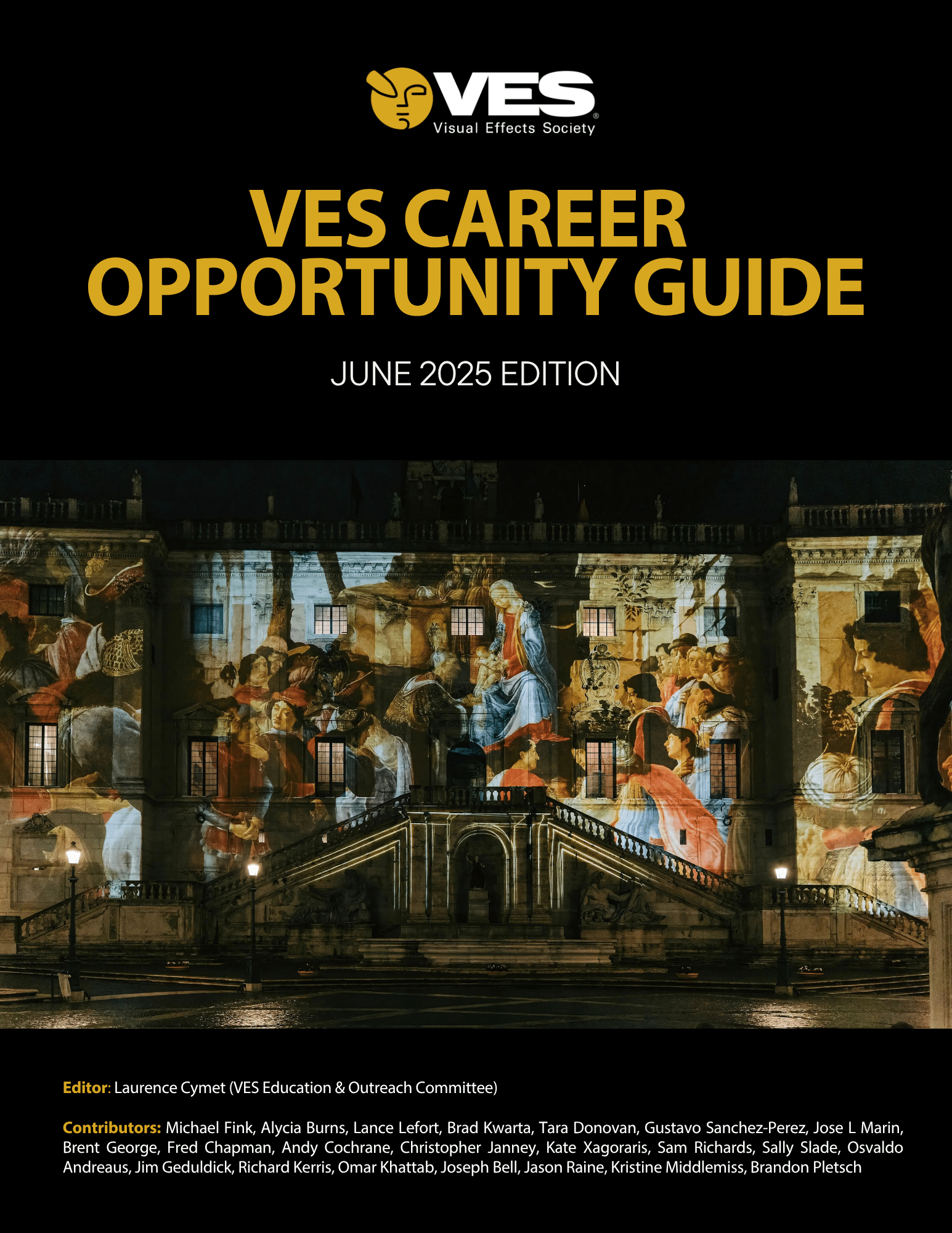Job Board
Maybe you’re unemployed, underemployed, or otherwise feeling restless. Here are some ways to help you refine your search and hopefully increase your chances of success.
Retooling Your Career Webinar
Watch this recording for artists, producers, and anyone in VFX or post-production asking, “What now?”- not because they’ve lost the love, but because the industry has shifted… and so has life. Many of us built careers in the trenches – on set, in dark suites, or chained to the render queue. But sometimes, life throws us a turning point. Maybe it’s the birth of a child. Maybe it’s burnout. Maybe it’s layoffs. Maybe you’ve been at it for decades and you are looking for something new. Whatever the reason, it’s time to pivot.
From SaaS to tech, from gaming to education, we’ll explore how the hard and soft skills honed in VFX can transfer into adjacent industries – ones still rooted in the tools and teamwork we know so well. This panel is about adapting without giving up. It’s about staying close to the craft, the community, and the creative spark that brought us here in the first place. If you feel you’ve been cast adrift, this is a place to listen, ask questions, get inspired, and start charting your next move while the industry regroups.
Opportunities in Immersive Media for VFX

The VES Tech committee in collaboration with the Education & Outreach Committee is proud to present an online panel exploring the emerging space of Immersive Media and the opportunities it presents for VFX practitioners and technology providers.
Extending the generation of imagery into occupied spaces to tell a story has become a growing area of industry. What was once limited to theme parks, is now becoming more commonplace in cities as people want more unique experiences to visit outside of their home. This growth has been supported by major improvements in accessibility to real-time technology and spatial 3d capabilities on common smart phones. Growth here is being further propelled by a lot of investment from localities seeking to improve tourism.
The crossovers between VFX and Immersive entertainment are significant, allowing VFX artists to bring skills in asset creation, layout, FX simulation, lighting, 360 compositing and more to a real-time space. Games and VFX artists with real-time engine experience will find a lot of opportunity here to apply their real-time in-engine skills, and engineers will find exciting challenges to apply mechanical and robotic techniques to produce unique live experiences.
Creators in the immersive entertainment space are always facing new challenges in digital, hardware and physical space – making it a chaotic, but exciting space.
VES Career Opportunity Guide
Advice for Job Seekers
So, you’re looking for a job.
Maybe you’re unemployed, underemployed, or just sensing that it’s time for something new. And let’s be honest—right now, it’s not easy. Jobs are scarce. Competition is fierce. But you’re not out of options.
Here are a few strategies to help you refocus, expand your possibilities, and move forward with intention:
- Start with clarity (even if it’s temporary clarity).
What do you want to do? If you’re multi-skilled or exploring a pivot, that answer might change. That’s okay. Pick a direction—just one—and look up a few people who are doing that job. What path did they take? What titles, skills, or industries show up on their LinkedIn profiles? This can give you a roadmap to follow (or remix).
- Take inventory—and think portable.
Look honestly at your skills and experience. What’s still relevant? What can be transferred to industries that are hiring? Roles in gaming, education, architecture visualization, medical visualization, SaaS, and even teaching often value storytelling, design thinking, and technical fluency. These might not be your dream industries—but they could be springboards.
- Expand your definitions.
Job titles vary wildly. A “3D Generalist” might also be called a “CG Artist” or “Environment Designer.” Use variations of your title when searching, and don’t be afraid to zoom out a little.
- Weigh your willingness.
Are you open to learning new tools or workflows? Taking a class? Relocating? Contract work? Teaching? Taking a temporary pay cut in exchange for new experience? There’s no one right answer, but being flexible can open up opportunities you might not have considered.
- Get curious, not just scrappy.
This is a time to explore—not just survive. The industry may be in flux, but your skill set still has value. Think of this as a reframe, not a rejection.
Where are the jobs?
Traditional VFX – Episodic, Motion Picture or Commercial
Most studios have a “careers” page – we’ve included some links to some of those here, in addition to some incredibly useful job board links:
Jobs Boards and Studio Listings:
Global Jobs Board 2.0 for VFX/Animation and Games
List of Studios:
3DVF Global Interactive Studio page
Studio Hog – VFX Studios in Canada
Studio Hog – VFX Studios in Japan
Studio Hog – VFX Studios in New Zealand
Studio Hog – VFX Studios in Spain
Studio Hog – VFX Studios in Germany
Animation and VFX Jobs – India
Gaming:
You can also check LinkedIn for global searches, Indeed, and Entertainment Careers for the US.
If you have any openings you’d like to highlight here, drop us a note at jobsboard@vesglobal.org.
Jobs Shared with VES:
We are working to identify more jobs boards in areas like Education, SaaS, ArchViz and Medical Visualization.
Your Resume
Your resume and why who you know still matters
A wise person once said, “The only thing I care about when I get a resume is who handed it to me.”
Translation? Relationships matter. Tap your network, and don’t be shy about building new connections. If you’re applying to a job, go beyond the job board—try to identify the hiring manager and reach out directly. A personal intro can go a long way.
Crafting a resume that gets seen
Most large studios use Applicant Tracking Systems (ATS) to screen resumes. These bots look for keyword matches from the job description—so tailoring your resume for each application isn’t optional anymore. Make sure to include the right language (as long as you actually have the skills).
When writing your resume, focus on impact, not just tasks. Use power words to describe what you achieved—not just what you were responsible for. Think: “Delivered 20+ shots under tight deadlines,” not “worked on shots.” You can explain the details in the interview.
Need help? Here are some ATS tips and tricks as well as some ATS friendly resume templates to get you started.
Your Reel
Keep it short—ideally under three minutes—and start strong. Lead with your best and most recent work to grab attention fast. Host your reel on a personal site, Vimeo, or YouTube, and make sure it’s easy to access and clearly labeled.
Include a breakdown to highlight your specific contributions to each shot, especially if you were part of a larger team. Bonus points if you list the software used—either within the reel or on your resume.
Before sharing, have a trusted friend or colleague review it. A second set of eyes can help catch things you might miss and ensure your work shines.
Your Network
When it comes to hiring, many managers focus on one key question: Who referred this candidate? Your network is a powerful tool for job leads, brainstorming career ideas, finding mentors or mentees, and staying informed on industry trends. To keep these connections strong, it’s smart to reach out for advice rather than job requests. When you seek advice, you open the door to meaningful conversations that could lead to unexpected opportunities. Just be mindful not to overdo it—regularly touch base with your network even when you’re not in need, and nurture those relationships with genuine human connection.
In Conclusion
We hope these tips help you in your job search. We’d love to hear from you—where are you looking for work? What’s the current landscape like for you? And how can the VES support you?
Drop us a line at jobsboard@vesglobal.org.


